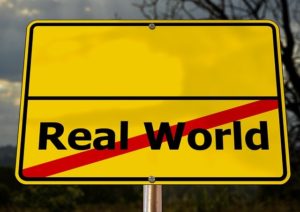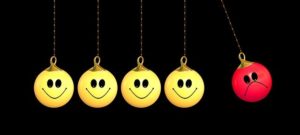Post COVID, Can We “Be Better Than Before?” Yes! Here’s How.

Last week was an interesting and somewhat grueling week for me, attending back-to-back, multi-day virtual conferences for two separate organizations I’m affiliated with. These were high-level conferences that one would normally fly to and pay dearly for hotel, meals, et. al.
Both were amazingly effective – the technology, with a few minor hiccups, worked amazingly well considering there were around 200 attending one and over 80 attending the other.
This is not news that a resort hotel wants to hear. Or the airlines. Or the liquor industry. Or the – well, you get the point.
Perhaps my biggest take away was that I experienced a better learning experience as a result of this being virtual than if it were across the country in a (typically) frigid hotel ballroom. The individual sessions were recorded and made available for further review. The participants provided .pdf’s of their presentations. In all, an opportunity to take the learning deeper than being live.
The obvious downside is the diminished ability to develop relationships with other attendees, although we did the best we could with “breakout rooms” the conferencing technologies provide.
The conference attendees were resume writers, LinkedIn strategists, coaches of all sorts, writers, wellness practitioners – a mix of folks dedicated to providing some level of service to others, all with the same thing on their minds:
Where is COVID taking us?
In the end, I believe everyone came away, at worst, neutral about what the COVID impact will be. Many, including myself, came away still enthused, encouraged, and unchanged in our commitment to get better at our craft, whatever that may be.
COVID doesn’t mean we can’t be “better than before.”
I want to share one little snippet of content from one of the conferences that I hope will be helpful and encouraging for you. It came from a young lady, half my age, who is a Master Certified Coach with a Master of Positive Psychology degree. She runs a very successful coaching business at The Flourishing Center.
Her name is Emiliya Zhivotovskaya, henceforth just Emiliya for obvious reasons.
Dealing with VUCA.
Trained in the powerful principles of Positive Psychology, Emiliya provided a “container” or a “framework” into which we can put what we are experiencing along with the suggestion that having this framework can help us move forward.
The container is V-U-C-A:
Volatility – Uncertainty – Complexity – Ambiguity

This is the first exposure I had to VUCA and it made a great deal of sense, not just for COVID, but for the changing world we are trying to negotiate.
The concept of VUCA goes back to 1987 with military origins as a strategy for operating in the cold war environment. It was later adopted by business and continues as a framework today.
Emiliya used VUCA to illustrate the need for resilience, for the ability to overcome the challenges we face as the pace of change accelerates and our world becomes increasingly unpredictable.
We weren’t born with it.
Resilience isn’t natural – it’s a mindset, a learned skill. Generally, most of us do pretty well with our resilience, but these are times calling for even more.
The field of Positive Psychology – and Emiliya – teaches that there are three internal skills that can help us get to resilience and beyond:
Purpose – Presence – Positivity
There is much talk these days about “finding your purpose.” What Emiliya revealed is that purpose without meaning is equivalent to “wheel spinning.”
The two are strongly correlated and important but very different.
In simple terms, meaning is the “why” of life. It is in her words:
“the subjective experience of feeling that life fits into a larger context and has significance; it connotes a sense of comprehension and that life, as a whole, makes sense.
On the other hand, purpose is the “what’s next” of life:
“an overall sense of goals and direction in life and has to do with directionality.”
This may sound a little “woo-woo” and new age, but it isn’t – it’s backed by substantial research.
I don’t want to take this into the weeds, so let me summarize just as Emiliya did. I think there is substantial fodder for some serious deep thinking surrounding this for all of us as we continue to look VUCA in the eye.
- Meaning is what makes us resilient.
- Purpose, once we are at baseline (i.e. with meaning), is that thing that makes us grow and flourish.
- Meaning is about comprehension e.g. “I can get my head around my life.”
- Purpose is about action e.g. “I know what I am about and how I can make an impact in the world.”
Before we can get to purpose, we need to get to resilience through meaning, answering the questions “why is this happening?”; “where am I?”; “where do I want to be?” That’s the baseline – then we can move to purpose and set goals.
Learning presence.

With a sense of meaning and purpose, the next important skill is being present, being “in the moment.” We’ve all heard how important it is – and if we’ve tried it, we’ve discovered how it seems nearly impossible. Emiliya reminded us why.
We are equipped with a “meaning-making brain” which, left to its devices, will be ruminating about the past or the future. It goes into the past to comprehend the future. When COVID or other disruptions hit, that “meaning-making brain” goes into overdrive reaching forward and backward trying to figure it all out. Being in the present moment can be a very frustrating experiment.
Mindfulness, or surrendering to the present moment, however, is an important internal skill that VUCA forces us into. It’s a superpower that narrows the gap between stimulus and response.
It’s an important component worthy of attention – be it through meditation or prayer or whatever device works best for you to get there. Without some way to be in the present, we face struggles brought on by being caught up in future-thinking and past-thinking and will likely experience knee-jerk responses to things going on around us.
Adopt positivity

Emotions impact us differently but this much we know from positive psychology research:
- When we are in a positive emotional state, we tend to be more “broadened” in the way we think about things, how we come up with ideas, how we notice more good things around us. Positive emotions create upward spirals.
- When we are in a negative emotional space, we tend to be more narrowed and more focused. Fear and pain narrow and focus us. Negative emotions create downward spirals.
As we face COVID and future VUCA, we should strive to broaden and build and get into a more positive state where we can be more creative.
I was reminded this week in my reading that order exists in all chaos. Order will return. What it looks like is hard to say, but resilience is how we prepare.
Thanks to Emiliya for this awakening. Please take the time to check out her website at https://theflourishingcenter.com/. She has great resources. We’d love to hear your thoughts about this as well. Leave us a comment below or email me at gary@makeagingwork.com.
Not on our list? Go to www.makeagingwork.com and sign up for our weekly articles.





Timely…maybe always timely. Best wishes, Patti
Useful information. Fortunate me I discovered your web site accidentally, and I
am surprised why this accident did not happened earlier!
I bookmarked it.
I liked up to you will receive performed proper here. The caricature is attractive, your authored subject matter stylish. nonetheless, you command get got an edginess over that you want be turning in the following. ill for sure come further before again since exactly the same just about very often inside of case you protect this hike.
Hello makeagingwork.com owner, Your posts are always well researched.
Dear makeagingwork.com admin, Your posts are always well written and informative.
To the makeagingwork.com owner, Keep the good content coming!
Hi there very cool blog!! Guy .. Beautiful .. Amazing .. I’ll bookmark your blog and take the feeds additionallyKI am happy to find so many useful information right here within the publish, we’d like develop more strategies on this regard, thank you for sharing. . . . . .
Hi makeagingwork.com admin, You always provide in-depth analysis and understanding.
Dear makeagingwork.com admin, Your posts are always well-received by the community.
Dear makeagingwork.com webmaster, You always provide practical solutions and recommendations.
Dear makeagingwork.com admin, Thanks for sharing your thoughts!
Hi makeagingwork.com webmaster, Your posts are always well-referenced and credible.
Dear makeagingwork.com admin, Your posts are always well researched.
Dear makeagingwork.com owner, Your posts are always well-supported and evidence-based.